Transforming the Lives of Farmers in Myanmar
By Zhang Li-yun (張麗雲)
Photos by Hsiao Yiu-hwa (蕭耀華)
Abridged and translated by George Chen (陳纘強)
Transforming the Lives of Farmers in Myanmar
By Zhang Li-yun (張麗雲)
Photos by Hsiao Yiu-hwa (蕭耀華)
Abridged and translated by George Chen (陳纘強)
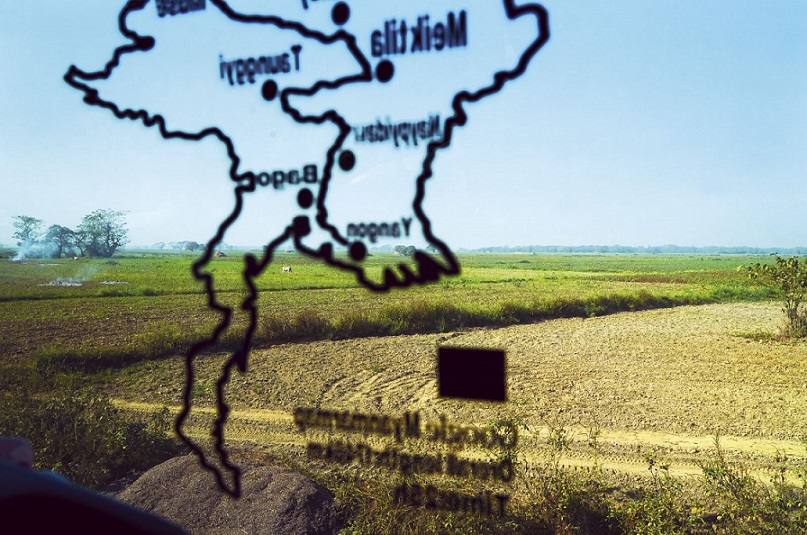
Driving past the endless vistas of lush plantations, the map on the car window reminds the visitor that this is Myanmar, a country devastated by massive floods in 2018. Yangon Region, Bago Region, Mon State and Kayin State were seriously affected. In February 2019, Tzu Chi distributed rice seeds to more than 47,000 farmers to cultivate on more than 80,000 hectares of land.
“We were a little overwhelmed when Tzu Chi insisted on giving the best rice seeds to us. For a while, I thought I was dreaming!” In Bago Region, Kyauk Ta Khar village chief U Soe Lwin Myint related that his 8 acres of farm land was entirely drowned by massive floods last summer, which destroyed all the ripening crops. As he had no harvest to sell, he had no money to repay the loan he took out before the planting season to purchase rice seeds, nor rice seeds to plant for the new season. He admitted he was very distressed as there was no tangible help in sight. When word got around that Tzu Chi would distribute rice seeds to the village farmers for free, he was initially sceptical. “Many charity organizations came and promised they would donate rice seeds, but they disappeared overnight without honouring the promise.”
This is not a fictitious tale, but a touching story that truly happened in Myanmar, a land of the Buddha. It all began by the Irrawaddy River…
Cyclone Nargis
Myanmar, a country renowned for its high-quality jadeite and golden pagodas that bejewel across its terrain, is a land of the Buddha embraced by mountains on three sides, with the Irrawaddy River meandering from North to South to provide one-third of the country's arable land for its kind-spirited people. The unique geographical landscapes and suitable climate make Myanmar one of the top ten rice exporters in the world today.
However, the local people half-jokingly lament that Mother Nature always likes to play a trick on this devoutly Buddhist country. Every year from February to May, the fierce sun radiates its merciless heat across the country. Then the monsoon season starts, bringing heavy rainfalls too rapid and copious for rivers to contain and causing widespread floods every year.
The climatic phenomena would have been ideal for rice plantation. However, rapid industrial development in the past century has resulted in more demand for more land, minerals and resources than needs. Jungles have been decimated, and trees are cut for sale before they reach maturity. Global warming ensues, which harms the ecosystem. However, this is but an inconvenient fact to be overlooked for economic gains.
On 2 May, 2008, tropical cyclone Nargis whirled into Myanmar, sending 3.6-meter tidal waves into its land. The Irrawaddy Delta, known as one of the world’s biggest rice exporters, was entirely submerged. The flood drowned all the crops and took more than 100,000 lives. The disaster shocked the world.
The military government of Myanmar initially refused foreign aid, but eventually relented when they realised the extent of the devastation. On May 8, 2008, a week after the disaster, the first batch of United Nations relief supplies was delivered into the country. On May 10, 2008, Tzu Chi Foundation became the first non-governmental organization to be admitted into the country to support the recovery work. Tzu Chi volunteers from Malaysia and Thailand immediately formed a disaster survey team and flew to Myanmar to offer on-the-ground disaster support. This marked the beginning of Tzu Chi’s charity work in the country.
Rural Areas Fall Behind in Development
In 2011, the Myanmar government opened its country to foreign capital investment. China, Japan, and South Korea rushed in to invest, aligning with the authorities in Myanmar to catapult the country’s economy at record speed. The average national income per capita has since risen from US$700 in 2011 to more than US$1,200 in 2017.
Yangon is the first city to experience rapid transformation. Within seven years, this backwater city has added modern buildings replete with neon lights and the latest technology. However, the rural regions have yet to experience similar growth and benefits.
U Kyaw Nyunt, representative of a farmer association and a village chief of Waw Township just two hours from Yangon, expressed the sentiment of many rural peasants. "The economy is growing, but the farmers' lives have not improved. For all the new construction and investment initiated by the government, we cannot feel it in our villages. We are only farmers who know about crop cultivation. If you send us to work in Yangon, we will not be able to adapt to city life!”
As rural infrastructure remains underdeveloped, the rural-urban divide continues to widen. It is especially evident during the monsoon season that brings torrential rain. Farmers are at the mercy of the weather, hapless with no technology or infrastructure to prevent or alleviate natural disasters. When flooding occurs, crops, livestock, and properties are destroyed, putting farmers on the brink of poverty.
In July and August 2018, a series of flash floods hit, causing widespread damage to the rural areas. The government issued a subsidy of 100,000 kyats (about 66 US dollars) to each affected household for disaster relief. In September 2018, Tzu Chi volunteers from Myanmar, Malaysia, and Taiwan visited the disaster areas to survey the damage. What they learned saddened them. Most of the affected farmers lived in a vicious cycle of poverty caused by natural disasters and financial debt.
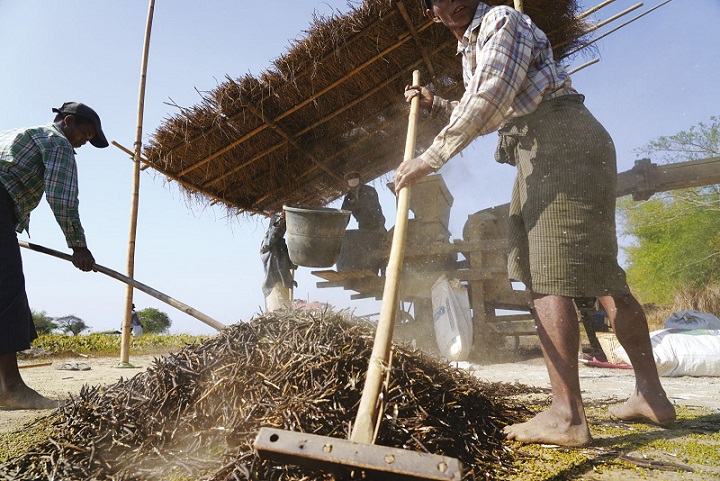
Mung beans are usually harvested before the beginning of the rainy season in May. The harvested mung beans are dried in the sun before being placed in a machine for shelling.
The prerequisite for low-interest government loans is land for collateral. However, the majority of the farmers do not own the land they plough. Therefore, they have to borrow from private companies which charge a much higher interest rate to purchase seeds for cultivation. The flood which wiped out their crops has left them with no harvest to sell, no money to repay their loans, and no capital to purchase new seeds.
Dharma Master Cheng Yen, upon hearing a report of the disaster, immediately requested Tzu Chi volunteers to first distribute mung bean seeds to the farmers to plant after the flood subsided. Tzu Chi volunteer Huang Qiu-liang (黃秋良) who led the disaster survey team said, “The best economically viable crop for dry season planting is mung beans, which will provide some income for the farmers before planting rice seeds during the rainy season. With great compassion, Master directed us to distribute both mung bean seeds and rice seeds to help the farmers break their cycle of poverty.”
On November 11 to 17, 2018, Tzu Chi volunteers donated 653 tons of high-quality mung bean seeds to four townships in Yangon Region and Bago Region, benefitting about 10,000 farmer households.
Mung Bean Bumper Harvests
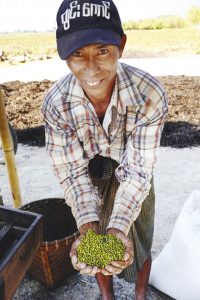
A farmer delighted with his mung bean harvest.
The mung bean cultivation experienced a bumper harvest in February and March of 2019, which provided temporary relief and hope to the farmers. Following Master’s request, Tzu Chi volunteers started sourcing high-quality rice seeds for farmers to plant in late May and early June. The aim was to enable farmers to reap bumper harvests in rice cultivation, but the procurement process was met with unforeseen challenges. Huang related: "There were four suppliers who promised to supply rice seeds to Tzu Chi. However, two suppliers eventually withdrew due to foreign exchange fluctuations. The third supplier was willing to help but would not trade on US dollars. Thankfully, the fourth supplier, U Maung Myint, promised he would help Tzu Chi to negotiate with other suppliers to fulfil the requested amount of seeds for distribution."
U Maung Myint had earlier supplied mung bean seeds to Tzu Chi and had also attended the distribution ceremony. He and his family were touched by Tzu Chi’s selfless contribution to Myanmar. He told Huang, “I often see Tzu Chi volunteers singing 'We're One Family' with sign language. I once thought that was just a performance, but it dawned on me that Tzu Chi actually puts it into action, embracing us, strangers without blood ties, like family.”
Upon successful procurement of the rice seeds, Tzu Chi enlisted the help of Hong Zai-sheng (洪再生) who has extensive experience in rice plantation in Taiwan. Hong immediately accepted the request and travelled to Myanmar at his own expense to help assess the quality of the rice seeds.
The Ministry of Agriculture, Livestock and Irrigation (MOALI) of Myanmar also gave its support to Tzu Chi. U Aung Moe Lwin, manager of the Department of Agriculture in Waw Township in Bago Region, said, “Tzu Chi is single-minded about choosing only the best seeds for the farmers. We checked their quality in the laboratory and determined which seeds have the best chance to sprout and mature. Through the process, 10 bags of rice seeds were rejected from the 100 bags. Seeing Tzu Chi’s noble intentions, we are willing to write off the loss.”
The painstaking process of sorting 4,200 tons of rice seeds took a month to complete and getting them ready for distribution. When Tzu Chi volunteers started the rice seeds distribution on February 10, 2019, the landscapes they saw were no longer devastated areas struck by floods, but a vista of lush green plantations.
When the farmers saw the Tzu Chi volunteers, they reported excitedly, “When there was a heavy downfall in January, we worried there would be massive flooding again to drown our precious mung beans. Miraculously, the rain delivered just enough moisture to provide best yield. It will be a bumper harvest!”
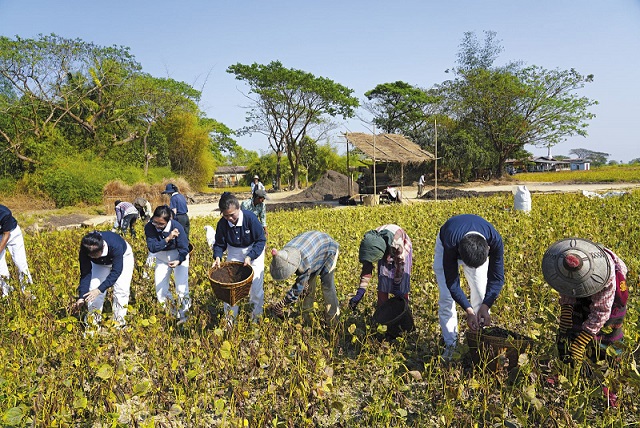
Tzu Chi volunteers help farmers to harvest mung beans in Bago Region. After massive floods in 2018 destroyed all the crops, farmers received mung beans from Tzu Chi to cultivate and have some income before the rice planting season.
Tzu Chi volunteers made a special trip to the mung bean fields, witnessing the farmers in their conical hats hard at work harvesting the fully ripened mung beans. It was a scene reminiscent of rural Taiwan forty to fifty years ago.
“Let's celebrate our bumper harvest with mung bean soup!” Tzu Chi volunteers in Myanmar cooked a few pots of mung bean soup to celebrate with the overseas Tzu Chi volunteers. “These are fat, delicious and nutritious mung beans!” The volunteers exclaimed with joy. Together with the farmers, they have come a long way, from helplessness from the disaster to hope from the harvest.
Saving Seeds for Future Cultivation
As the rice seeds were distributed during the mung bean harvesting period, many villagers wanted to remain in the farm to gather their ripened crops before the rainy season started. U Kyaw Nyunt, the village chief of Waw, came to the distribution center with a stack of notices belonging to his village farmers, ready to collect rice seeds on their behalf. “A bag of mung beans can be sold for 50,000 kyats (around 33 US dollars). If we do not harvest quickly before the rain starts pouring, we may suffer heavy loss.” Having also received Tzu Chi's mung bean seeds, he also happily said, “I can proudly verify that the seeds we received have a much higher yield than we have ever experienced. I used to harvest 50 bags, but this year I harvested 120 bags on the same piece of land, which is 70 more bags!”
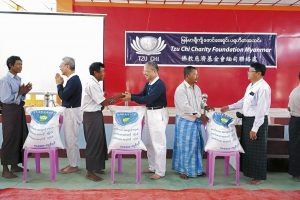
Tzu Chi volunteers, together with local government representatives and the beneficiary farmers from Bago Region, interact happily in a temple used for distribution. Tzu Chi volunteers followed the local etiquette by walking barefoot into the temple.
U Kyaw Nyunt also shared that the government has stepped up their support, such as lending farming machines to accelerate harvesting speed. When the villagers heard Tzu Chi would distribute the best rice seeds, they eagerly looked forward to cultivating them. “We all hope that we will have a bumper rice harvest too so we will have enough rice seeds for future cultivation. If we can have such good fortune every year, we can improve our livelihood.”
Tzu Chi volunteers also made an effort to visit farmers who were not registered to receive the rice seeds, assessing if they too needed the support. For example, farmer U Myo has been depending on his 2 acres of land to feed his family of six. The land was submerged in the 2018 floods, but he did not go to MOALI to register the damage, therefore he was not in the list for Tzu Chi rice seeds distribution. Instead, he took out a 5% interest loan to purchase mung bean seeds. After paying off his loan and workers’ wages from the harvested sale, he only had 100,000 kyats (about 66 US dollars) left, or equivalent to 2 months of living expenses for his family. Therefore, he had to take up part-time work in the city to earn an average of 7,000 to 8,000 kyats (about 4.5 to 5 US dollars) a day.
This is typical of average peasant farmers in Myanmar with no end of their poverty cycle in sight. There are 14 regions and states in Myanmar, of which more than 10 were affected by massive floods last year. The Tzu Chi Foundation focused on the worst affected areas of Yangon Region, Bago Region, Mon State and Kayin State, completing the distribution to farmers in more than 500 villages in 10 days. There are still many poor villages that Tzu Chi volunteers have not yet reached, and it is hoped that local people can give rise to love and help those in need.
Spreading Compassion and Benevolence
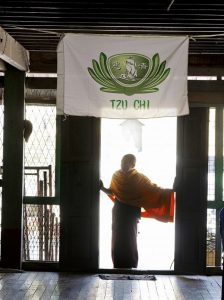
In the Bago Region, a monk opens a door and curiously looks into a temple where Tzu Chi will distribute rice seeds to the farmers.
On February 25, 2019, Tzu Chi volunteers arrived in Hpa-An City near the Thai border to distribute rice seeds to more than 5,000 households. Hpa-An is located in Kayin State, a region rife with interracial and nationality issues which resulted in civil unrest and armed conflicts. Tzu Chi volunteers and MOALI officials still decided to reach out to the impoverished farmers in this area after the local government issued a security clearance to travel.
On the day of the distribution, the temple used for the event was too small to sit all the farmers comfortably. Still, everyone sat patiently and serenely without any unease. U Win Naig Oo, a manager at MOALI, presented the opening speech to them: “We all know it is extremely inconvenient to travel to Hpa-An, yet Tzu Chi volunteers were determined to come. They know we have encountered difficulties, and they are here to help. They will not just leave after distributing the rice seeds to us, but will always come to care for us.” U Win Nair Oo encouraged the farmers to work hard to develop this region where the Karen people mainly reside. “We accept help now, and will also help others when we have the ability to do so in the future.”
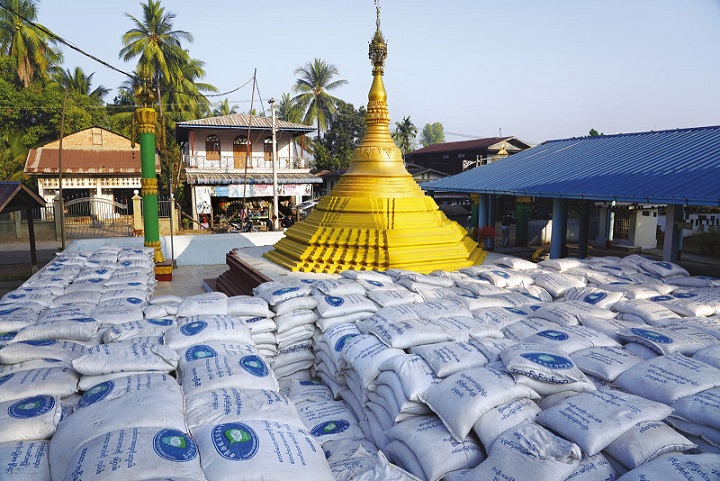
In a temple in Kayin State, bags of rice seeds donated by Tzu Chi surround the stupa, waiting to be distributed to more than 40,000 farmer households. With the support of 400 volunteers from Myanmar, Malaysia, and Taiwan, distribution was completed within 10 days and was possible with the aid of cloud technology and the local government.
The temple, housing up to 500 people, was a scene of quietude and calm when Tzu Chi volunteer Soe Tinzar Win introduced Tzu Chi's origins in Burmese to the farmers, sharing how Tzu Chi started with a group of housewives led by Master Cheng Yen to help others by saving a penny a day in a bamboo bank. In Myanmar today, a similar approach has been initiated by the farmers to donate a handful of rice everyday in lieu of money. The practice of donating with rice banks has gathered momentum, with many farmers who have received Tzu Chi's support starting to give back through sharing their rice.
U Saw Win Kyaing, a village head in Hpa-An, was visibly moved by Tzu Chi volunteers’ sharing. He picked up the microphone and said to the villagers, "Tzu Chi volunteers bring the true essence of the Dharma teachings to Myanmar. We can give and help people in need by donating a handful of rice at each meal too!"
The kindness and gentleness of farmers in Myanmar have been extensively reported throughout the world. Guo Min-zi (郭敏姿), a Taiwanese entrepreneur and a Tzu Chi volunteer who has relocated from Mainland China to Myanmar to invest, shared that people in Myanmar have a long tradition of saving a handful of rice each day for the future. Yet, village chief U Kyaw Nyunt also said that while the local people are kind and helpful, most of them only support temple monks and nuns, and donate to the construction of pagodas. They think this is the only way to gain merits. So, it is common to witness people jostling to give up their seats for a monk or a nun in a bus, but totally ignore a pregnant woman standing in the fast moving vehicle. “Now that the villagers have received the Dharma teachings and love from Tzu Chi volunteers, they have also started saving a handful of rice each day and adding 1,000 kyats (around 0.65 US dollars) to their rice bank to help villagers in need,” said U Kyaw Nyunt.
Before Tzu Chi volunteers started the distribution, they travelled deep into the countryside to listen to the farmers’ woes and promised they would return to help. They kept their promise, and in turn moved the farmers to care for others by saving a handful of rice. To more than 50,000 farmers, Tzu Chi brings not only the hope of a bumper harvest, but also ripple effects of compassion and benevolence.
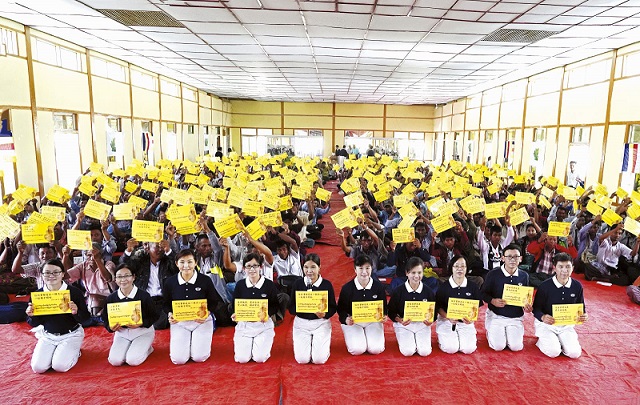
After the distribution ceremony, Tzu Chi volunteers present each farmer with a Jing Si Aphorism card in Burmese and Chinese. The farmers are delighted and say they will read it at home everyday to encourage themselves and their family.
When Myanmar was hit by Cyclone Nargis in 2008, Tzu Chi immediately went into the country to assist with the disaster relief, and soon distributed high-quality rice seeds for farmers to cultivate. The story of Tzu Chi’s bamboo banks moved a farmer, U Thein Tun, to initiate a practice of putting aside a handful of rice before cooking each day to help others. U Thein Tun also practiced the Buddhist precept of not killing by not using pesticides, and he was rewarded with a bumper harvest. Other farmers followed suit, and soon the benevolent practice of donating rice banks spread to other villages.
Upon hearing the practice, Master Cheng Yen also encouraged Tzu Chi volunteers to learn from the good deeds of the farmers in Myanmar by eating 80% and leaving 20% to help others. From the bamboo banks of Tzu Chi's early days in Taiwan to the rice banks initiated by Myanmar farmers, Tzu Chi continues to spread love and compassion around the world.
Contact Us | Plan a Visit | Donate
8 Lide Road, Beitou 11259, Taipei, Taiwan
886-2-2898-9999
005741@daaitv.com
©Tzu Chi Culture and Communication Foundation
All rights reserved.
